Whether you want to protect your community from crime or to help reform the justice system to be more humane and equitable, an online masters degree in criminal justice may be the credential you need.

Many different specializations fall under the umbrella of Criminal Justice. The one you choose will determine what new opportunities may open before you.
Editorial Listing ShortCode:
If you’re already working in the field of criminal justice and don’t have time for traditional courses, earning your masters degree in criminal justice online may give you the scheduling flexibility you need to reach your goals without quitting your job.
Online Master’s Degrees in Criminal Justice
Many quality universities have online masters programs in Criminal Justice. Within those programs are a number of different specialized degrees.
Listed here are three of the best online masters degrees in Criminal Justice. Click on any of the entries to go straight to the section describing what coursework that degree would entail and what career fields it may open access to:
None of the specializations are objectively better than the other, but each may set you on a radically different path than the other.
Criminal Justice

A masters degree in Criminal Justice may lead to managerial positions in prisoner advocacy, law enforcement, and corrections.
If your undergraduate degree is in Criminal Justice, you’ll probably transition smoothly into your masters coursework. If not, you may be able to fulfill some prerequisites with courses or relevant job experience. This isn’t a terribly big deal, but it might add time (and time means cost of credit hours) to how long it takes to complete your program.
There are Criminal Justice programs focusing on forensics, cybersecurity, corrections, law enforcement, and homeland security.
Online criminal justice coursework often includes crime analysis, law, behavior science, crime mapping, violence, and victimization. Masters level coursework often includes classes on study design, research methodology, and statistical methods. Those skills can help prepare you to conduct your own research studies.
Editorial Listing ShortCode:
Masters programs usually culminate with either a research capstone project or an internship, both of which may be critically important in shaping the direction you take your masters degree. They’ll be the ultimate proof of your readiness to contribute to the field.
Potential jobs following graduation include forensic science technician, information security analyst, probations officer, correctional treatment specialist, crime analysis, crime mapping, and detective.
A masters degree may also pave the way for you to get your PhD. Some entry level academic positions also require only a masters degree to start.
Homeland Security

The Department of Homeland Security defends the United States against a wide variety of threats. It handles border protection, cybersecurity, domestic terrorism, and natural disaster management.
The Coast Guard, Transportation Security Administration, and Immigration and Customs Enforcement (ICE) are all part of the Department of Homeland Security.
A masters degree in homeland security may get you ready to contribute to one of those fields and institutions. It might also get you in the door at the FBI, CIA, ATF, or Secret Service.
Editorial Listing ShortCode:
Depending on your specialization, your study may include terrorism, intelligence methods, information security, weapons of mass destruction, consequence management, or emergency management.
Potential jobs include geographic information systems analyst, security analyst, border patrol agent, immigration officer, cyber security analyst, and program manager.
Law Enforcement

Of all the options discussed so far, an online masters degree in law enforcement may have the clearest path forward. While the degree is not entirely inflexible, its very name makes its purpose clear.
With this degree, you’re almost certainly going to be pursuing a job that involves enforcing the law in some capacity. Whether it’s as a police chief, a detective, or an FBI agent, you’ll probably be looking for a career busting bad guys of one kind or another.
Editorial Listing ShortCode:
If you already work in law enforcement, a masters degree can help get you into a leadership role. In cases where the degree has a more technical focus, you may find yourself using computers to protect your community at a much broader level than would otherwise be possible.
Potential jobs include customs and border protection officer, police chief, FBI or CIA agent, criminal profiler, and criminologist. Coursework often includes research methods, correctional leadership, comparative criminal justice, globalization of crime, and cultural competency in criminal justice.
Criminal Justice Careers & Salaries
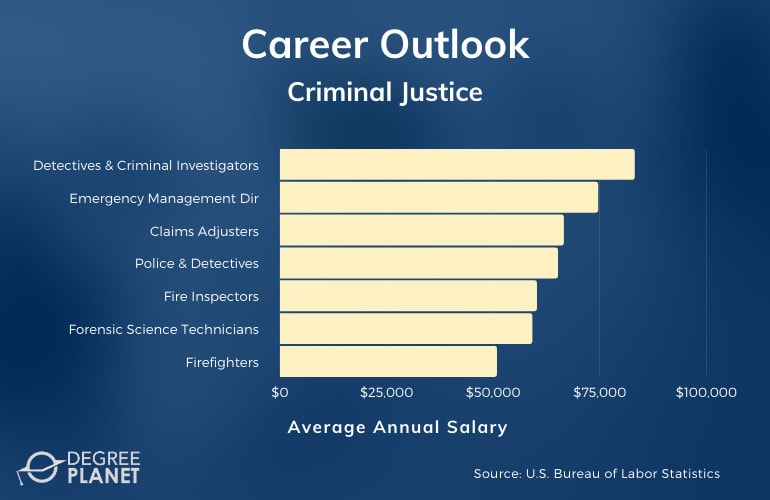
If you’re looking to earn a masters degree in Criminal Justice, you’re probably already working in the field and looking for a path to promotion. Or maybe you’re just an ambitious newbie who’s already looking ahead to the future. Either way, the degree may open up any number of interesting career opportunities.
You may begin (or advance) in the fields of law enforcement, private security, juvenile justice, border patrol, cybersecurity, or emergency management.
Careers in Criminal Justice often provide a strong sense of duty and contribution, but many jobs in the field can be quite lucrative, as well. Check out director of strategy or cyber security engineer, for example.
The FBI requires a bachelors degree for entry, but competition for their positions is generally fierce. A masters degree in Criminal Justice can help in giving you one more credential to set you apart.
Editorial Listing ShortCode:
It’s also possible that a masters degree in Criminal Justice could lead to a position in academia. Most professorial positions require a PhD, but there are opportunities for those with masters degrees as well. All salary and career data are provided by the the Bureau of Labor Statistics
| Career | Annual Median Salary |
| Detectives and Criminal Investigators | $86,940 |
| Emergency Management Directors | $76,250 |
| Claims Adjusters, Examiners, and Investigators | $68,270 |
| Police and Detectives | $67,290 |
| Fire Inspectors | $64,610 |
| Forensic Science Technicians | $60,590 |
| Firefighters | $52,500 |
| Correctional Officers and Bailiffs | $47,440 |
| Police, Fire, and Ambulance Dispatchers | $40,980 |
The table shows just a few of the career fields potentially available to you if you earn a masters degree in Criminal Justice. There are many others out there waiting to be explored.
Criminal Justice Curriculum & Courses

Criminal Justice encompasses a wide variety of focuses and specializations, which means there’s a broad array of coursework you may encounter.
- Criminal Justice Policy and Analysis: This course gives a comparative overview of criminal justice policies from the local to the federal level and can help you learn how to analyze those policies in order to judge their effectiveness (or lack thereof).
- Research Theory, Design, and Methods: This course can help prepare you to construct your own research plans and to carry them out effectively. It can also help prepare you for your capstone research project and for conducting studies in your future job.
- Criminal Justice Leadership: This course examines the psychology of leadership and the administrative aspects of running various Criminal Justice institutions.
- Ethical Decision Making: This course examines the philosophical aspects of law enforcement and can help guide you in making proper ethical choices as you do your Criminal Justice job.
- Crime Scene Investigation & Management: This course examines how to set up a crime scene, ensure the scene isn’t contaminated, effectively direct coworkers and subordinates around the scene, and perform the hands-on scientific work of figuring out exactly what happened.
- Advanced Forensic Science: This course examines the cutting-edge science involved in processing evidence found at crime scenes.
- Risk Assessment: This course can help you learn how to effectively recognize risks to yourself, your organization, and the public. It discusses methods to analyze the severity of a given threat, to manage potential negative outcomes, and to communicate risk to the public and to your coworkers.
- Crime mapping: This course can help you learn how to use mapmaking software called geographic information systems. You enter spatial data into the software in order to identify things such as patterns of criminal activity or areas that are experiencing spikes in one form of lawlessness or another.
Admissions Requirements

Schools don’t all share the exact same requirements for admission, but there are some items that are found in most of the programs you’re going to encounter.
- GPA (undergraduate and graduate): Masters programs will look at the GPA you earned in prior coursework. They almost universally have a minimum requirement you need to meet to even be considered for admission.
- Letter of Intent: A Letter of Intent tells admissions personnel why you’re interested in taking their program and what you intend to do with the degree. At the masters level, schools frequently are interested in producing graduates who will contribute in a meaningful way to the Criminal Justice field. A Letter of Intent will also note your participation in past research projects.
- Undergraduate degree in in Criminal Justice, Police Administration, Law Enforcement, or Corrections: Some programs may require that your undergrad degree is in one of these subjects. In most cases, you may make up for the lack of such a degree by either providing proof of relative job experience or by taking individual undergraduate courses that would have been included in undergrad Criminal Justice study. Sometimes, this might mean something as simple as taking Criminal Justice 101 and 102. Specifics will vary by program.
- GRE Scores: While more and more programs are ditching the GRE score requirement, there are still many who will require it. It might be good to research what kind of GRE scores the university is accustomed to seeing from applicants. If your current score isn’t high enough, you may want to consider retesting.
Accreditation
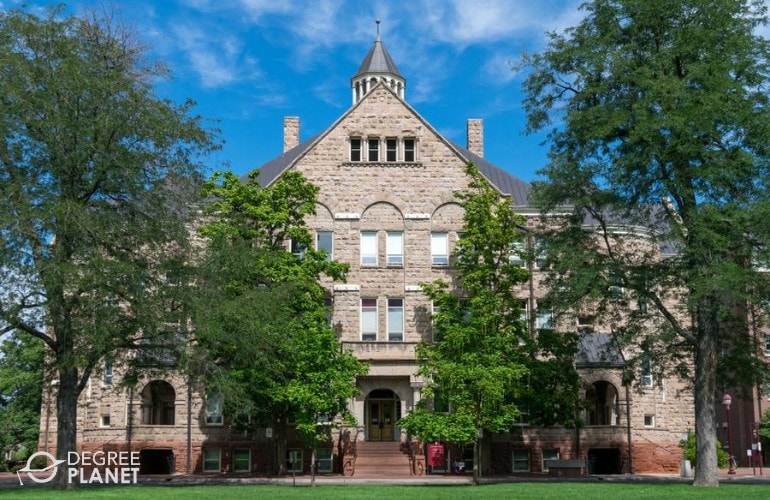
In nearly every circumstance, a school that isn’t regionally accredited is a school that isn’t worth attending. There’s also national accreditation, but regional is the gold standard.
A degree is only worth as much as the school its earned from. Whether or not it’s fair, nearly everyone is going to judge a school’s value by first looking to see if it’s regionally accredited.
Editorial Listing ShortCode:
Most experts would advise that you shouldn’t even waste your time looking at a school unless it’s regionally accredited, so this may be the very first place you want to start looking as you shop for programs. The information is easy to find.
If you can’t find your answer with an internet search, just contact the university’s admissions center. They’ll be able to provide you the answer right away.
Criminal Justice Professional Organizations

Professional organizations may give you opportunities to network with other professionals, find jobs, talk shop, and contribute to Criminal Justice research.
- Academy of Criminal Justice Sciences
- American Correctional Association
- American Probation and Parole Association
- American Society of Criminology
- National Association of Blacks in Criminal Justice
- National Criminal Justice Association
- National Institute of Justice
All of these professional organizations are highly respected, but each has a culture and a focus unique to itself. Any one of them may also have a particularly strong presence in your region, so it might be a good idea to ask around your local community.
Financial Aid and Scholarships

The financial aid and scholarship system works the same as it did during your undergraduate studies. There will be different scholarships and grants available, but it’s mostly the same process.
Some universities will fully fund masters-level work, but this isn’t very common for online degrees. That may change as education continually transitions to online study, so it never hurts to at least check.
There are private and federal loans, just as you probably experienced as an undergrad. Federal loans are by far the most commonly used. Grants are generally given away on a competitive basis in order to fund areas of research or work.
All sorts of different organizations and individuals give away scholarships based on things such as merit, race, socioeconomic background, and religion. Many of these are broadcast nationally, but there are bound to be some distributed locally in your area.
Community and state scholarships might not be as easy to find as the major national ones. Your local library or the university you seek to attend might be good places to start asking around about them.
Is a Masters Degree in Criminal Justice Worth It?

Yes, a masters in criminal justice is worth it for many professionals.
That being said, only you can define what “worth it” means to you. If we’re talking a simple matter of return on investment, then the answer is “yes” for many. This is partially dependent on your age.
The way to figure this out would be to calculate the average salary of the career you’re aiming to attain with your masters degree and then multiply the average salary by the number of years you expect to continue working.
Subtract the expected cost of your degree from the number that resulted from the multiplication. If the value left over is positive, then the degree was objectively “worth it.” To do a full analysis, you’d also need to factor in opportunity cost. That may be a level of complexity deeper than you are to go.
Editorial Listing ShortCode:
When it comes to your decision to get a masters degree in Criminal Justice, many factors are less tangible than salary and impossible to calculate with simple math.
According to the Bureau of Labor Statistics, protective service jobs are set to grow at 3% over the next 10 years. Common careers in this field include correctional officer, bailiff, forensic science technician, detective or criminal investigator, and emergency management director.
The pride you’d feel in earning the degree and the satisfaction you’d get from a heightened feeling of competence, respect, and personal power are subjective things that simply cannot be measured with numbers alone.
What Jobs Can You Get With a Masters Degree in Criminal Justice?

A masters degree in criminal justice may make you eligible for a diverse array of jobs in law enforcement, corrections, juvenile justice, homeland security, border patrol, and emergency management.
- Correctional officer supervisor
- Police and detective supervisor
- Cybersecurity investigator
- Intelligence analyst
- Emergency management director
- Special agent at a federal agency: FBI, DEA, ATF, ICE, Secret Service
- Criminal profiler
- Federal Marshall
- Fraud investigator
- Security management
Unlike an online associate’s degree in criminal justice, a master’s degree can take you in a number of potentially stimulating and profitable directions.
Are Online Masters Degree Valid?

Yes. As long as the school is regionally accredited, you’re good to go.
Many, if not most, schools will award online students the exact same degree they award those who attend the physical university. In most cases, the faculty teaching the online masters students are the same faculty that teach the traditional masters students.
Are There Any Online Masters in Criminal Justice No GRE Programs?
Yes, and the number of online criminal justice masters programs online that don’t require GRE scores seems to be growing every year.
Even in cases where schools want GRE scores, they often allow waivers for various circumstances and qualifications.
What Can You Do With a Masters Degree in Criminal Justice?

A masters degree in criminal justice can help you pursue a fulfilling job in law enforcement, corrections, juvenile justice, cyber security, homeland security, border protection, and emergency relief management.
It may also get your foot in the door of academia, both as a faculty member and as a PhD candidate.
How Much Does a Master’s in Criminal Justice Cost?
For in-state tuition, the average cost per credit hour ranges from around $120 to around $500. These costs may increase significantly if you’re attending a school in a state you’re not resident of, but that depends on the school.
Many schools offer online students e-tuition rates similar or identical to in-state rates. Other schools charge the same rate no matter where you live. So, the answer to this question is very much situationally dependent. Check with your prospective school’s policy.
How Long Does it Take to Get a Master’s in Criminal Justice Online?
Full-time students generally take two years to complete their masters degree program.
Editorial Listing ShortCode:
Some programs can be completed in as little as nine months. The time it takes will depend not only on the program but also on how much time you have to give to the program.
Are There Any Affordable Online Criminal Justice Masters Programs?

Yes, there are many affordable criminal justice masters programs online. Some programs cost less than $4,000 to complete for in-state students. There are many that go for less than $7,000.
If you’re looking to attend a school outside your state of residence, you’re going to see costs rise significantly. Even there, there are degrees that can be had for around $15,000.
Universities Offering Online Criminal Justice Master’s Degree Programs
Methodology: The following school list is in alphabetical order. To be included, a college or university must be regionally accredited and offer degree programs online or in a hybrid format.

Boston University is recognized for its research facilities and academic achievements. Serving the community as a private University since 1839, Boston University educates students throughout the world who seek to earn an undergraduate, graduate, or professional degree.
With hundreds of programs to choose from, Boston University serves students via online and in-person.
- MS in Criminal Justice
Boston University is accredited by the New England Commission of Higher Education.

Operating since 1910, Bowling Green State University is a public school in Ohio that is recognized throughout the US for its research facilities and academic excellence. BGSU offers undergraduate, master’s, and professional degrees in more than two-hundred majors spread between eight colleges.
It also has an assortment of degrees that can be accessed fully online.
- MS in Criminal Justice
Bowling Green State University is accredited by the Higher Learning Commission.

California State University – Long Beach joined the ranks of the California State University system in 1949 as a public educational option. With one of the lowest tuition prices in the nation, CSULB makes earning an undergrad, graduate, or doctoral degree easier for many state residents.
Program variety is vital to CSULB; it has more than 150 majors to choose from.
- MS in Criminology and Criminal Justice
CSULB is accredited by the Western Association of Schools and Colleges.

Developed in 1893, Concordia University-St Paul stared as a small Christian school. Throughout the years, it has morphed into a private university that educates more than 5,000 students every year.
Students attending CUSP can take advantage of its virtual learning programs and its vibrant campus location to earn one of its many undergraduate or graduate degrees.
- MA in Criminal Justice Leadership
Concordia University-Saint Paul is accredited by the Higher Learning Commission.

East Carolina University has been offering public education since opening in 1907.
Working to serve students throughout the state of North Carolina, and throughout the world, through several campus locations, research facilities, and distance learning, ECU allows students to obtain an undergraduate, graduate, or doctoral degree in a variety of academic areas.
- MS in Criminal Justice
East Carolina University is accredited by the Commission on Colleges of the Southern Association of Colleges and Schools.

Opening its doors in 1965, Florida International University is known internationally for its advancements in technology and research. This public university allows students a wide assortment of academic majors to help them earn a bachelor’s, master’s, or professional degree. Florida International University is also known for its schools of medicine in law.
- MS in Criminal Justice
Florida International University is accredited by the Commission on Colleges of the Southern Association of Colleges and Schools.

Students wanting to further their education at an affordable public school have turned to Kent State University since it opened in 1910. KSU awards baccalaureate and graduate degrees in many study areas, including science, criminal justice, and arts.
Students attending Kent State have access to various research opportunities and can study online or in-person.
- MA in Criminology and Criminal Justice
Kent State University is accredited by the Higher Learning Commission and a member of the North Central Association.

Lamar University has made gaining higher education easy since opening in 1923. It provides a public education option for students looking to gain an associate, bachelor’s, or graduate degree. LU encourages students to become active in its many academic research opportunities.
It has more than one-hundred academic majors and offers both online and campus-based learning options.
- MS in Criminal Justice
Lamar University is accredited by the Southern Association of Colleges and Schools Commission on Colleges.

Lewis University makes private education affordable to thousands of students each year. Opening in 1932 and founded in the Catholic religion, Lewis University serves a diverse population of students that hope to earn an undergraduate or graduate degree in one of the more than a hundred academic programs offered.
Some programs offered at LU include criminal justice, business, and education.
- MS in Criminal Justice
Lewis University is accredited by the Higher Learning Commission.

Commenced in 1971, Liberty University is one of the most well-known private universities in the world. Liberty surf students on campus and through his distance learning platform. It is known as a military-friendly school Ann has more than 600 academic areas of study. Programs offered at Liberty University include religion, criminal justice, and engineering.
- MS in Criminal Justice – Cybercrime Investigation
- MS in Criminal Justice – Forensic Psychology
- MS in Criminal Justice – Homeland Security
- MS in Criminal Justice – Law Enforcement Leadership
- MS in Criminal Justice – Public Administration
Liberty University is accredited by the Southern Association of Colleges and Schools Commission on Colleges.

Founded in 1833, Mercer University helps students around the world game higher education by offering a variety of undergraduate, graduate, and professional degrees. Students who attend Mercer University can complete their degree on campus or take part in virtual learning opportunities.
MU is a private school committed to empowering students to succeed.
- MS in Criminal Justice and Public Safety Leadership
Mercer University is accredited by the Southern Association of Colleges and Schools Commission on Colleges.

Michigan State University has been inspiring students to seek higher education since it commenced in 1855. As a public education leader, Michigan State University holds itself to a high standard by providing research, innovation, and technology to all students enrolled in one of its undergraduate, graduate, or doctoral degree programs.
- MS in Criminal Justice
MSU is accredited by the Higher Learning Commission.

National University has been offering private education since 1971. Students attending NU can choose a traditional learning style or go beyond campus walls and participate in one of its many distance learning programs to achieve an associate’s, bachelor’s, or graduate degree.
Students who choose two attend classes online can take advantage of National University’s accelerated learning programs.
- Master of Criminal Justice
National University is accredited by the Western Association of Schools and Colleges.

Known as a military-friendly school, and the birthplace of ROTC, Norwich University opened its doors to public education in 1819. Campus-based programs were designed to help students achieve undergraduate and graduate degrees in a variety of majors.
Distance learning opportunities have risen throughout the years, making Norwich University a leader in its field.
- MS in Criminal Justice
Norwich University is accredited by the New England Commission of Higher Education.

Rowan University has been helping students thrive in public education since 1923. It has more than one-hundred bachelor’s and post-graduate degree programs and research opportunities to help challenge students to meet the demands of today’s economic needs.
Some programs offered at Rowan University include liberal arts, criminal justice, and engineering.
- MA in Criminal Justice
Rowan University is accredited by the Commission on Higher Education of the Middle States Association of Colleges and Schools.

Offering a private education based on the Catholic faith, since 1851, Saint Joseph University implores a holistic approach to each of its undergrad, master’s, and doctoral programs. Each course curricula is based on liberal arts and helps to maximize student potential.
Examples of majors offer that SJU includes criminal justice, applied behavior analysis, and business.
- MS in Criminal Justice
Saint Joseph’s University is accredited by the Middle States Association of Colleges and Schools.

Created in 1889, Saint Leo University is a private, Catholic school for higher education that reaches students throughout the globe. Saint Leo University strives to help students find their place in the world as they maneuver through academic and personal challenges in order to obtain an associate, bachelor’s, or graduate degree.
- MS in Criminal Justice – Behavioral Studies
- MS in Criminal Justice – Corrections
- MS in Criminal Justice – Criminal Investigations
- MS in Criminal Justice – Critical Incident Management
- MS in Criminal Justice – Forensic Science
- MS in Criminal Justice – Legal Studies
Saint Leo University is accredited by the Southern Association of Colleges and Schools Commission on Colleges.
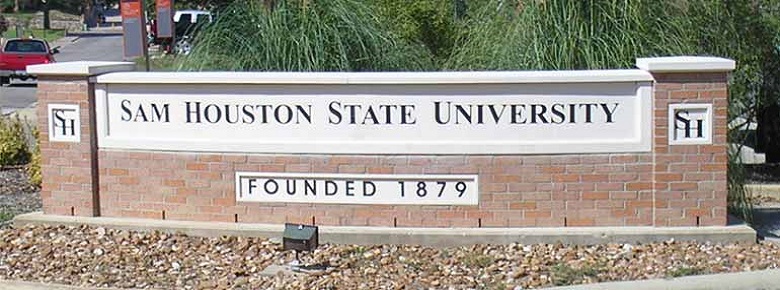
Sam Houston State University was founded in 1869 and has worked hard to provide a public education while helping students find a sense of belonging as they maneuver their way through higher education. Students attending SHSU have access to over 150 academic programs that lead to undergraduate, graduate, and advance degrees.
- MS in Criminal Justice
Sam Houston State University is accredited by the Southern Association of Colleges and Schools Commission on Colleges.

Located on the Mississippi River, Saint Cloud State University has been helping students reach their ambitions since it commenced in 1869. SCSU is a public, comprehensive school that offers more than two-hundred undergrad degrees, sixty graduate degrees, and several doctoral programs.
Many of these degree options can be accessed through its distance learning platform.
- MS in Criminal Justice
Cloud State University is accredited by the Higher Learning Commission and is a member of the North Central Association.

Founded in 1888, Tiffin University provides private education to busy adults who need a flexible and affordable school option. Students at Tiffin University can take classes on campus or through its virtual learning format.
TU has an assortment of undergraduate opportunities and a dynamic graduate degree program for students ready to take the next step.
- MS in Criminal Justice – Crime Analysis
- MS in Criminal Justice – Crime Science
- MS in Criminal Justice – Criminal Behavior
- MS in Criminal Justice – Homeland Security
- MS in Criminal Justice – Homeland Security Administration
- MS in Criminal Justice – Justice Administration
Tiffin University is accredited by the Higher Learning Commission.

Providing public educational services since 1963, the University of Central Florida has been positively impacting the world through education and research ever since.
Offering more than 200 areas of study, including programs like criminal justice, STEM, and education, UCF helps thousands of students worldwide acquire an undergraduate or graduate degree each year.
- MS in Criminal Justice
The University of Central Florida is accredited by the Southern Association of Colleges and Schools Commission on Colleges.

Offering both traditional and online learning opportunities, The University of Cincinnati was created in 1819 as a school for higher education and has made leaps and bounds in the areas of public education and academic research. UC has several paths for students to take in order to earn an undergraduate, graduate, or doctoral degree.
- MS in Criminal Justice
The University of Cincinnati is accredited by the Higher Learning Commission.
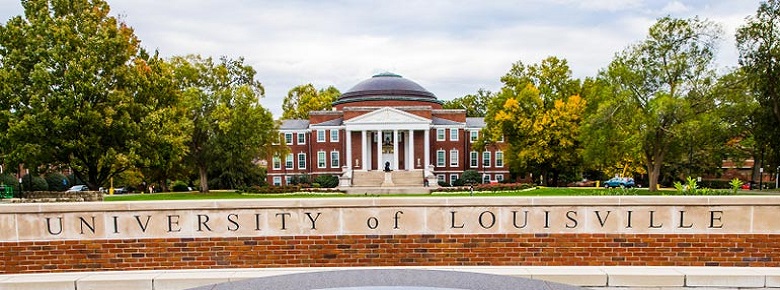
As one of the most steadfast schools in the nation, the University of Louisville began providing public education in 1798. Known as a phenomenal research facility, UL accepts students worldwide and helps them achieve an associate, bachelor’s, or graduate degree. The University of Louisville has made great strides in the medical community.
- MS in Criminal Justice
The University of Louisville is accredited by the Southern Association of Colleges and Schools Commission on Colleges.

With its starting point in 1912, the University of Memphis Has a notable history of providing public education that is rich with culture and research.
Um’s many bachelor’s, master’s, and professional degrees assist learners in exploring key information needed to gain leadership roles in top industries and encourages students to become involved in community service areas.
- MA in Criminal Justice
The University of Memphis is accredited by the Commission on Colleges of the Southern Association of Colleges and Schools.

Created in 1920 and shared community space and faculty with Yale University, the University of New Haven was a private junior college that grew into an educational powerhouse. Today it has various academic courses of study that allow students to achieve an undergraduate, master’s, and advanced professional degree.
- MS in Criminal Justice
The University of New Haven is accredited by the New England Association of Schools and Colleges.

Offering various educational programs that lead to a bachelor’s, master’s, or doctoral degree, the University of North Texas has been serving students since its establishment in 1890. This private educational facility prides itself on the ability to provide practical learning and a variety of research opportunities.
Online and traditional classroom settings are available at UNT.
- MS in Criminal Justice – Justice Policy and Administration
The University of North Texas is accredited by the Southern Association of Colleges and Schools Commission on Colleges.

Offering practical learning since 1890, the University of Oklahoma provides public education to students looking to earn a bachelor’s, graduate, or advanced degree. With many program majors to choose from, the University of Oklahoma has three campuses and a dynamic virtual learning platform for students to access their academic curriculum.
- MS in Criminal Justice
The University of Oklahoma is accredited by the Higher Learning Commission.
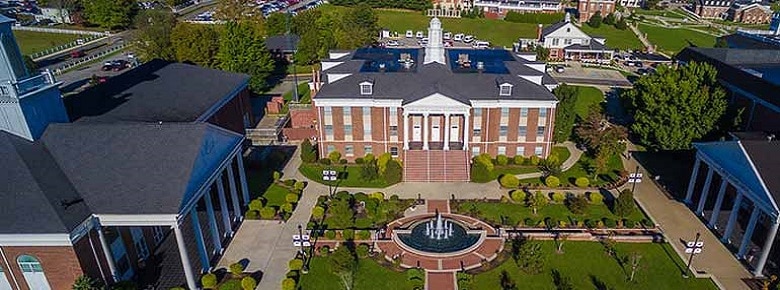
Student success is not wording that the University of the Cumberlands takes lightly. Since 1888, this public school has been offering affordable tuition to help students obtain two-year, four-year, master’s, and professional degrees in a range of academic areas.
While enrolled at the UC, students are given free textbooks and access to a variety of other academic tools.
- Master’s in Criminal Justice
The University of the Cumberlands is accredited by the Southern Association of Colleges and Schools Commission on Colleges.

Established in 1868, Wayne State University is a public research university that sits in Detroit, Michigan. With 13 schools in six satellite campuses, Wayne State University meets the challenges of providing higher education to more than 20,000 students every year.
Undergraduate and graduate students can choose from over 300 academic areas of study at WSU.
- MS in Criminal Justice
Wayne State University is accredited by the Higher Learning Commission.

Wichita State University originated in 1865. With multiple expansions over the decades, WSU now includes six colleges and a dynamic online platform that allows students to attend undergraduate and graduate programs and have access to academic research that relates to their field of study.
This public university holds many events and activities throughout the year.
- MA in Criminal Justice – Corrections
- MA in Criminal Justice – Forensics
- MA in Criminal Justice – Homeland Security
- MA in Criminal Justice – Law Enforcement
Wichita State is accredited by the Higher Learning Commission of the North Central Association of Colleges and Schools.
Getting Your Master’s Degree in Criminal Justice Online

Whether you want a leadership position in the Criminal Justice field or you want a specialized, technical job, enrolling in an online masters degree program might be the right choice for you.
With online education expanding every day and so many great opportunities already waiting, there may never have been a better time to explore the possibility. You’re probably reading this page because you want more out of life and out of yourself.
Maybe you’ve read this page and pages like it dozens of times before. Maybe you’ve been batting this idea around for months or even years. Maybe now is the time to just go for it. If not now, then when?

